Around the World in 109 days
Um die Welt in 109 Tagen
04.05.-21.08.2008
Kazakhstan, 08.-16.05.2008 
Time zone: Atyrau = GMT + 5h; Aralsk, Turkistan & Almaty = GMT + 6h
1 Euro = 185 Kazakh Tenge
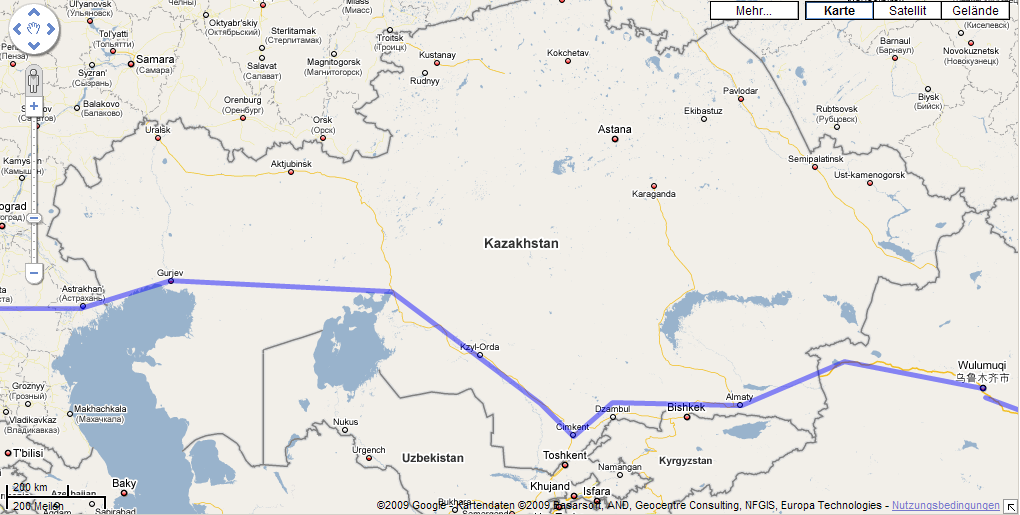
Friday, 09.05.2008
We arrived at Atyrau rain station at 3:40am, my first stop in Kazakhstan.
Many Kazakh people went off the train here, too, often with heavy loads of
luggage like 50 kg steel tubes and valves. Amazing what people take with
them on a train. Atyrau is located not far from the Caspian Sea and today
an important town due to the oil fields there. However, the train station
did not look like that. Well, there were about six ATMs (and even half of
them was actually working) and five snack and convenience shops (where I
could buy an inexpensive Kazakh cell phone card), but the ticket counter
did not open before 6am, so I had several boring waiting hours. There other
people around did not seem to bother, though, they looked like experienced
waiters, just sit and wait, not even reading a newspaper. The young lady
at the ticket counter even spoke some English (hooray!) and after some
discussion, questions and explanations (and after half a dozen had pushed
themselves in front of me while I was talking to the ticket lady, to buy
their own tickets immediately, I guess I have to stop behaving in a polite
Japanese manner here) I finally had my train tickets to Aralsk and Turkistan.
Unfortunately, the next train to Aralsk only left the next morning to I
had to look for an accommodation in the rather expensive city of Atyrau.
So I took the bus downtown and then walked over the bridge crossing Ural
river which is the border between Europe and Asia. Well, now I had left
the first continent and the biggest one on my trip lay right in front of me.
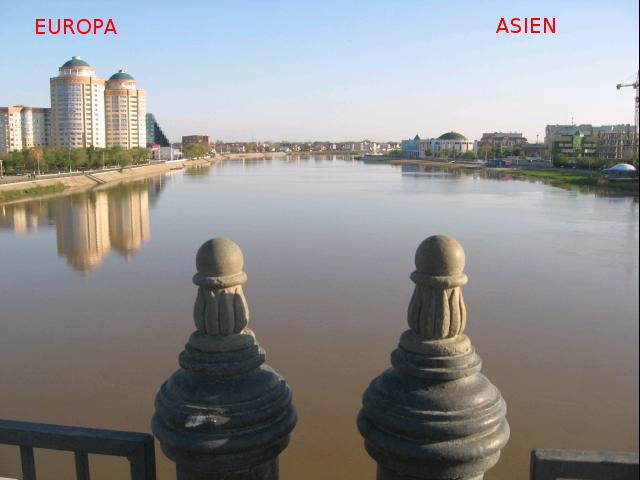
Then I walked to Hotel Kair that was recommended as a less expensive option
in my Lonely Planet guidebook, but it was 30 percent more expensive then
stated in the book (which wasn't old though) and nobody there spoke English,
but it was nice to have a shower and wash some of my clothes after days in
buses and trains, and to have some time to write about my travel experiences.
In the late afternoon I finally got up again to explore Atyrau. First, I
had a walk to the beach of Ural river close by the hotel, but it was not
as impressive as I had expected, just some sand at the riverside, no real
"beach". So I crossed a nice pedestrian bridge back to Europe, walked
through Pobedy Park to the town square in the center located next to the
beautiful Mangali mosque. A bit further north I had a look at the golden
"onion" towers of the Russian-orthodox church and then walked over the
Satpaev-Abay bridge back to Asia. There, I had a beer and a beer omelet (!)
in the Guns-&-Roses bar of the rather expensive Ak Zhaik Hotel while enjoying
their free WiFi internet. Finally I could go online with my own computer and
didn't have to bother with error messages in Russian language.
Back at my hotel I heard the sounds of fireworks nearby, and when I came to the
riverside up the road I could watch beautiful fireworks on the other side i.e.
in Europe. Suddenly I understood why I had seen so many posters in the city
mentioning World War II. It was the 9th of May, the day of the German
capitulation 1945 and the "Day of Victory", a national holiday in Russia
and also Kazakhstan.
Photo gallery: Atyrau
Saturday, 10.05.2008
As I did not want to wait for a bus I went (together with a Kazakh lady) to
the train station by private taxi. In Kazakhstan, like in Russia, it is
possible to get a ride in any private car just by waiting at the street,
flagging it down and paying the drive an amount similar to the normal taxi
fare (around 1-3 Euro).
At 6:55am I started my next long train ride through the plains of Kazakhstan.
The view was nice but after some time it became kind of monotonous (it's
just prairie) and after my laptop's battery was empty, too, it was really boring.
Well, the man sitting on the opposite seat seemed to be quite nice, but
unfortunately he spoke only Kazakh and Russian, so no chance for a nice chat.
At least there was some distraction by the numerous vendors (or maybe they were
just normal passengers carrying goods) selling not only "ordinary" goods like
cigarettes, drinks, cookies and other food, but also socks, trousers or huge,
smoked fish (where did they catch them in the middle of the dry prairie???).
Another popular selling good - I guess I will never learn why - were colorful
plastic birds with batteries that could chirp and clap their wings. Sometimes
the train sounded like the tropical house in a zoo.
When the sun set in blood red color in the prairie (I have seen a couple of
amazing sunsets in Central Asia) I could see little fires at regular intervals
next to the train tracks, something like lighthouses for the train? Well,
being a foreigner you can't expect to understand everything, and nobody could
explain it to me either (well, maybe in Russian). So I finally lay down to
sleep and enjoy the comfort of a Russian sleeper train, cheaper than a hotel
room and waking up hundreds of kilometers away, in a completely different
region. Really convenient.
Photo gallery: Train ride
Sunday, 11.05.2008
Arriving in Aralsk (the train station is called Aral More) at 3:30am
was rather hectic. Contrarily to the bigger stations the stop here
was only a few minutes so that I had to hurry, grab my things and
jump out of the train when the train attendant woke me up. (I was
also a bit confused because of the one hour time shift between Aralsk
and Atyrau.) For the first time since I had arrived in Kazakhstan it
was raining, and it rained heavily. As it was still pitch dark, too,
I took a seat in the station waiting room, under a huge communist wall
mosaic, resisted the taxi drivers who wanted to drive me to some hotel
and waited for daylight.
Around half past six the sun rose and the rain had ceased. So I took
the 10 min walk into town, that was still asleep, and had a look at
the harbor of this former fishing town with some old rusted boats. But
there was no Aral Sea to see, not because of low tide, but due to
unecological politics of the former USSR. At that time the government
had ordered to tap the two main rivers feeding the Aral Sea, Syr-Darya
and Amu-Darya, to irrigate huge cotton plantations so that only little
water finally reached the Aral Sea which in consequence lost 80 percent
of its water mass. So fishing towns like Aralsk are now 50 km (ten years
ago it were even 100 km) away from the shore of the sea and have lost
their main economic base. So I could see rusted ship wrecks in the steppe
that were only close to some little water ponds because it had rained
heavily in the morning. I decided to have a walk in the sea that wasn't
there and admired some involuntarily dry fallen ship wrecks.
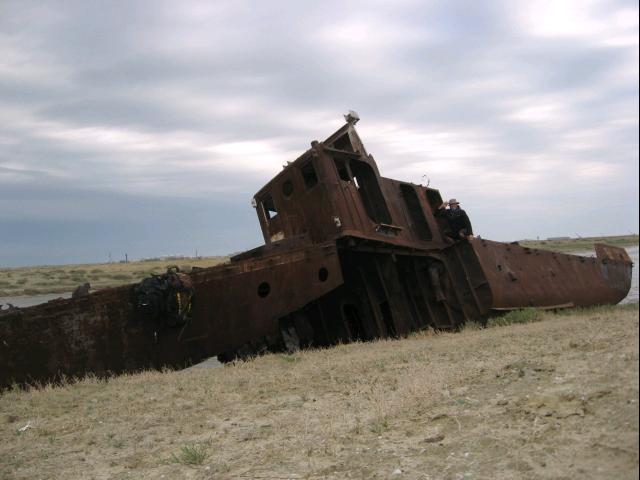
Heading further west the rather muddy soil became harder and dryer and
finally I was in a literal desert that used to be - as I could see from
the many shells on the ground - the bottom of the Aral Sea some decades
ago. Now there aren't any living sea animals anymore but instead camels
with whom spent my lunch break while we were watching each other curiously.
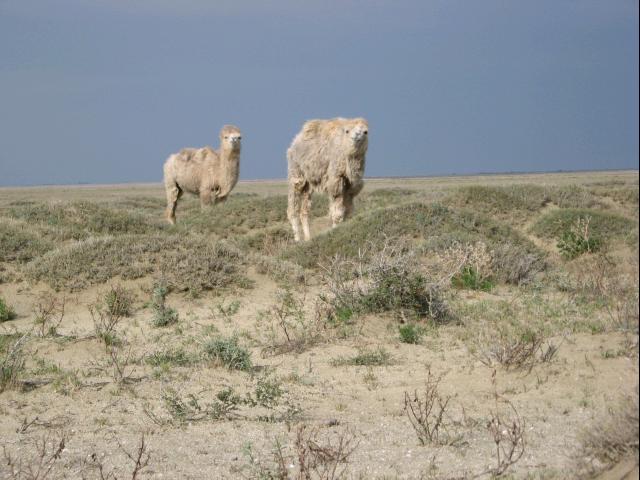
Back in Aralsk city I visited the office of "Aral Tenizi", a social NGO
that tries, with financial support from Denmark, to improve the situation
of the local fishermen. After a dam was built between the northern and
southern part of the Aral Sea a few years ago, the water level of the
smaller, northern part of the sea is rising and slowly approaching the
town again. There is still some fish alive in the lake and Aral Tenizi
are trying (with measures like educational lessons) to make sustainable
fishing possible. A new fish processing plant is getting more work, too,
and slowly the situation seems to improve.
Nevertheless, the town appeared to me quite dead and dusty and actually
pretty boring because apart from the Aral Sea there is little to see, and
even the sea is not there. So I went to a little restaurant (where I was
the only customer) to eat something, the only available meal on the menu -
borsch, a Russian vegetable soup that was actually really delicious. After
that I had a look around the local bazaar, bought some provisions and,
because there was - not very surprisingly - no internet cafe in town.
(They only had a so called computer center full of kids playing console
games.), went back to the harbor to watch the sea/desert under the blue
sky.
After some time a group of little boys were approaching, apparently
interested in the exotic foreigner with his huge backpack. Some of them
even spoke some English (and with more effort than most adults I had met
so far), taught me some of their games and presented acrobatic tricks to
impress me. That was quite distractive.
So time finally passed a little faster and when the sun started to set
around half past eight I went back to the station where I had to wait a
few more hours (well, I was used to it) for the 0:56am train direction
Turkistan. I had to share my compartment with a young Kazakh guy and an
older Russian man, both drinking beer and apparently having fun. But after
21 hours action in Aralsk I was just too tired and went to sleep very soon.
Photo gallery: Aralsk
Monday, 12.05.2008
When I woke up in the morning, the young Kazakh guy, Askar, apparently
my new friend, sat down next to me immediately to have a nice chat with me.
That means he talked to me enthusiastically in Russian and I did not
understand a word, but he did not mind at all. Instead, he tried to teach
me a little Russian by letting me repeat some sentences while I had no
clue what they meant. As this guy was kind of exhausting I lay down to
sleep again what he accepted - after some time. Around 11am I had really
slept enough, and when I opened my eyes my new best friend was immediately
back by my side and a bottle of beer in my hand. Well, it looked like I had
no chance but drink a breakfast beer with Askar (for him it was definitely
not the first beer this morning), chat with him (sometimes our Russian
neighbor was at least able to translate some words to English or German)
and take photos with Askar and the other passengers. When we arrived in
Turkistan at 1pm Askar was really disappointed that I had to get off the
train, I on the the other hand was rather relieved to get rid of this maybe
nice but kind of exhausting guy.
Photo gallery: Train ride
At the station I already bought the train ticket to Almaty for the next day,
then I took a taxi into town (paying 400 Tenge because the driver claimed to
have no change). Already at the train station I recognized that Turkistan is
a bit more touristy than Aralsk and Atyrau because the taxi drivers and
vendors were more annoying but that still did not mean that anybody spoke
English. The lady of Hotel Sabina where I got a very simple room for 2000
Tenge only spoke Kazakh and Russian, but luckily I arrived at the same time
as two students (Roman from Slovakia and Lenka from the Czech Republic),
who knew Russian and could translate for me. I had, however, to wait some more
for the shower I had been longing for so much because the was no water
available in town (or at least this part of Turkistan) from 11am till 5pm
as the hotel lady told us. Welcome to the desert!
So I just changed clothes and then had lunch with Roman and Lenka in a cafe
on the other side of the the street. The menu showed 30 different meals
but after asking there were only three available so I ended up with
delicious borsch again. The cafe staff, too, did not have change money so
we got some chewing gum back instead. That reminded me a bit of Noth Korea.
After lunch I took a marshrutka (minibus) to the Migration Police to get
my visa registration. The immigration card I had received at the border
said that I had to register my visa within five days or get fined, but
the police officer in Turkistan who was responsible for visa registration
told me that due to the weekend and national holiday I still had 2-3 days
time and should register my visa in Almaty. I asked him to register me
nevertheless, now that I was already there, and that I doubted that all
policemen who might check my passport on the train (as it happened daily)
would count the 5 days like he did (because even the guidebook said five
calendar days and not 5 working days). But the police officer still refused
after 20 min discussion to just give me this simple stamp, started to get
annoyed by this foreigner disturbing him who was busy sitting in his big
chair and almost had me kicked out of his office. Really pissed off by the
Kazakh police I left his office just to meet the guard at the entrance guide
who wanted to get a 500 Tenge tip from me because he had written my name in
the visitors book when I arrived. I answered that nobody would get any tip
here if I don't get my registration stamp and just went away, the guard
shouting after me but fortunately not following me. Once again nice encounter
with authorities. Now I understood why my guidebook warned more of the police
than of criminals in Kazakhstan.
After that I wanted to exchange my remaining Russian Rubles to Tenge but at
the bank they only accepted US Dollars. (Why should they accept the currency
of their biggest neighbouring country?? Grr.) But finally I found a little
exchange counter on the local bazaar where I got rid of my Russian money.
After all these annoying experiences I wanted to finally have some nice
experiences in Turkistan and took a taxi to Sauran, roughly 40 km northwest
of Turkistan. This time the taxi driver was - surprisingly - not annoying
but quite friendly and - when I told him that I was from Germany - presented
me his German language skills: "Eins, zwei, drei" and "Heil Hitler". I had
already heard similar things from several Kazakh people who usually did not
even know what it meant, but I think the Goethe Institute has a lot of work
to do in Kazakhstan to teach other aspects of the German language, too.
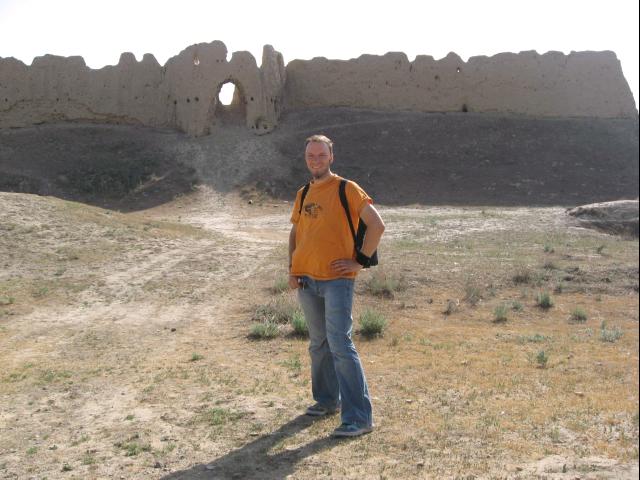
The only remains of Sauran, an ancient bastion town at the Silk Road, are
parts of its city walls rising from the deserted plains, a really impressive
view already when we approached around 6pm. I entered the inner part of this
ancient town through a hole in the wall (which might have been a gate) to see
only steppe grass growing where a huge town had been in former times. I was
the only visitor and there were not even ticket sellers or annoying vendors,
so I could feel a little like an explorer when I surrounded ancient Sauran
(actually there are two other towns called Sauran in the area, too) walking
atop the former fortifications walls. After one hour I had seen most of it
and took a nice 45 min taxi ride back to Turkistan.
Back at Hotel Sabina I ran into Roman who had just had a shower in the
common "bathroom". (Actually, the shower looked more like a narrow storage
room while the toilet room was huge featuring a toilet seat in an elevated
location not unlike a king's throne.) But when I also wanted to wash away
the desert dust from my body, the nice hotel manager(who was in fact really
nice even though most things he told were bad news) locked the shower cell
again and told me that the water time was already over again. However, he
promised to wake me a up the next morning at 7am when there would be running
water again for as short while! Whaaaaa! After two nights in the train,
however, I wanted to at least wash my hair and thus had a mineral water
bottle shower over the washing basin after that a felt much better.
Without much hope for success I then went for a walk searching for an internet
cafe. Actually, I really found a sign saying "Internet" leading to the local
Qazaktelekom building, but that was currently under reconstruction and closed.
A man standing in front of it told me that there probably was not any other
internet connection in Turkistan either. Who expects an internet connection
in a town of 100000 inhabitants?
At least I found a little supermarket where I bought some cheap orange juice
to get some vitamins and healthy food. However, I got a bit suspicious about
that juice when I accidentally spilled a bit of if and the ants on the street
did not dare try the sweet stuff but instead literally ran away from it.
Anyway, it tasted good though.
In the evening, right on time for sunset, I wandered too the Yasaui mausoleum,
a local monument really worth a visit (and tourist attraction number one in
Turkistan). The mild evening climate, the peaceful atmosphere and the view
of hundreds of years old buildings were really worth the effort coming to
Turkistan (and a bit the trouble with the police). The area in front of the
mausoleum was also one of the few places where I could see women wearing a
headscarf, though still worn in a rather relaxed way. Concerning Islamic
dress code muslim Kasakhstan seems to be quite liberal. For example, I could
see couples openly showing theit affection to each other in public parks,
which is quite unusual even in countries like Japan.
After my visit to the mausoleum I went the open air restaurant/cafe (in
Germany it would probably be called beergarden) Nauryz, just a few meters
from my hotel. There I ate "mangla" (a kind of Kazakh ravioli), enjoyed
local beer and - sitting on a absolutely comfortable sofa - watched
evening life in that location. You can really spend some relaxed hours
at Nauryz. Later, Roman showed up and we talked for a few hours about
our travels and experiences in central Asia.
Photo gallery: Turkistan
Tuesday, 13.05.2008
(Longer reports in English are coming soon...)
Another day in the train...
Photo gallery: On the way to Almaty
Wednesday, 14.05.2008
I arrived in Almaty and finally managed to register my visa. Then I took a
taxi south and hiked up to the
Tian Shan Astronomical Observatory
where I had a close look on the mon and some stars and spent the night, too.
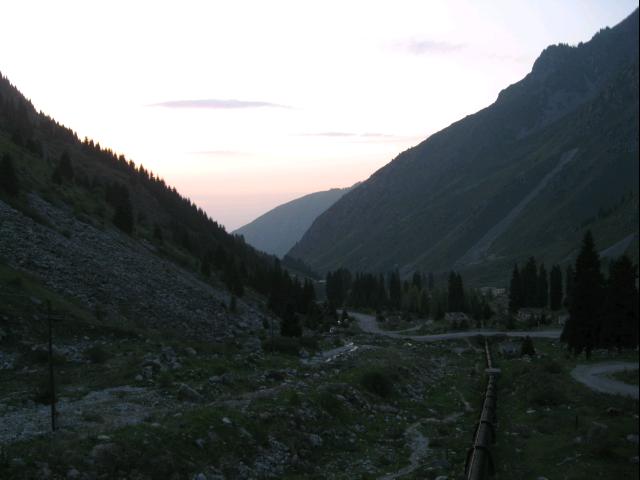
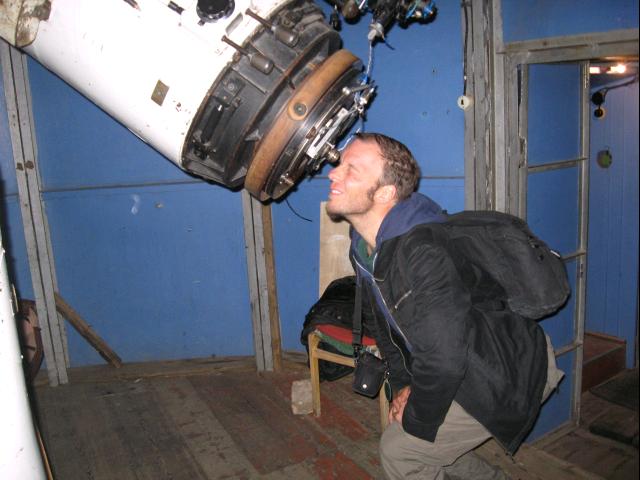
Photo gallery: From Almaty to Tian Shan
Thursday, 15.05.2008
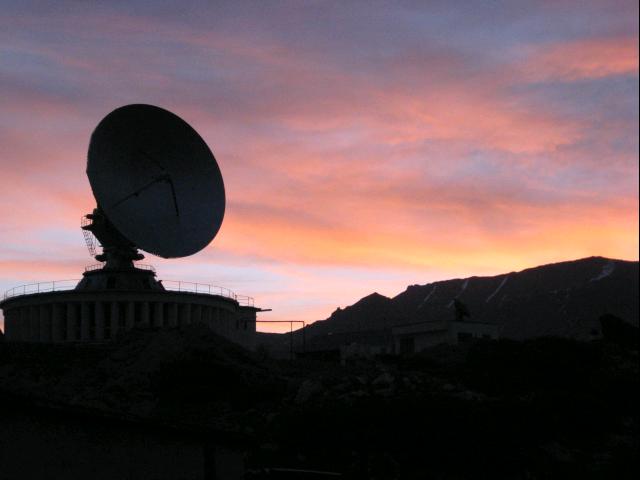
After leaving the observatory I met two Czech hikers and joined them on a
fantastic mountain tour.
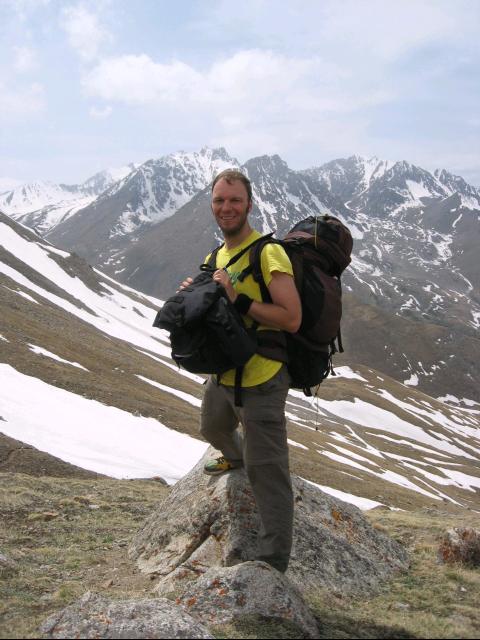
Photo gallery: Tian Shan
In the evening I came back to Almaty and spent the night there.
Photo gallery: Almaty
Friday, 16.05.2008
In the morning I jumped on the sleeper bus to China, crossed the border in
the afternoon (with some trouble).
Photo gallery: To China
I arrived at Urumqi the next morning.
next: China
back to the main RTW page.










